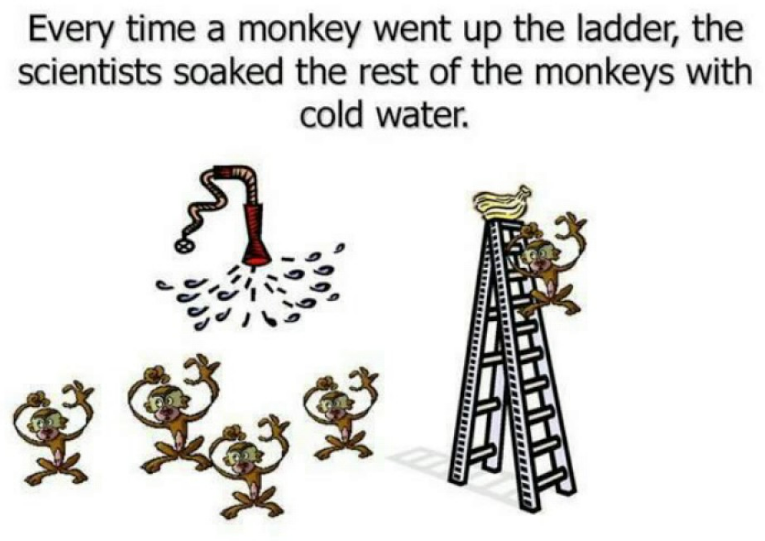The 5 Monkeys Experiment: A Lesson in Conformity & the Power of Questioning — From Monkeys to Management Mindsets

my notes ( ? )
1. Understanding the 5 Monkeys Experiment
The “5 monkeys experiment” serves as a remarkable demonstration of how individuals can become conditioned to obey without comprehending the underlying reasons.
In this experiment, monkeys were placed in a cage, with a ladder leading to bananas suspended at the top. Here are the experiment steps :
- Whenever a monkey tries to climb the ladder, the other monkeys are sprayed with cold water.
- Monkeys learn to avoid the ladder, even when the cold water is no longer present.
- Replace one of the monkeys with a new monkey.
- The new monkey sees the bananas and tries to climb the ladder.
- The other monkeys, conditioned to avoid the ladder, attack the new monkey.
- The new monkey learns to avoid the ladder, even though it doesn’t know why.
- Even after removing all the monkeys that felt the cold water, the newly integrated monkeys continue to avoid climbing the ladder.
2. The Power of Peer Pressure: A Look at the Asch Experiment in the 21st Century
It’s fascinating how this experiment can be applied to so many different fields. For instance, there are many superstitions that people believe in, such as avoiding ladders or breaking mirrors, as they think it will bring bad luck.
Moreover, some coworkers may resist implementing new processes, software or tools. The sentence I heard the most is definitely:
— > “We’ve always done it this way”, I bet you heard that one, right?
It can be frustrating when your project is transversal without hierarchical roles… However, such challenges will push you to develop an essential skill :
→ Convincing people!
To do so, I always put myself in the shoes of the ones involved in the project. Thinking in terms of benefits from them, not only the project, people like attention and recognition, We all do!
The bottom line is to know
Why you are doing it!
When you know what you want to achieve, it’s easier to inspire others to join you!
Never give up on someone who is reluctant to join your cause. They may surprise you with their loyalty and dedication once they are convinced of your vision.
Questioning authority is not always disrespectful. In fact, it can be a sign of cleverness. However, there are some places where questioning authority is not allowed, such as in the military!
3. Duty and Discernment: The Delicate Equilibrium of Obedience and Critical Thinking
“Starting to think is starting to disobey !”
Is often used in the military to discourage soldiers from questioning orders. However, I believe that this saying is a bit extreme. It’s possible to think critically and still FOLLOW and not OBEY orders. In fact, critical thinking is essential for making good decisions, even in the military.
In some cases, it may be necessary to question orders to prevent harm or save lives.
In 1983 during the Cold War, Stanislav Petrov, a Soviet lieutenant colonel, prevented a nuclear war by disobeying orders and not reporting a false alarm.
His decision to disobey orders literraly saved the World!
However, in other cases, it may be more important to obey orders without blinking to maintain order and discipline.
This phenomenon is commonly observed in various aspects of our lives, including cultural traditions, workplace practices, and societal norms.
Here are a few more examples:
- Superstitions: The belief in superstitions often involves following practices without understanding the underlying reasons.
- Organizational Practices: In a professional setting, people might continue to follow certain processes or procedures simply because “that’s how things have always been done.” This can lead to inefficiencies and resistance to change, even when there might be more effective methods available.
- Educational Systems: Educational methods and curricula can sometimes be resistant to change, with educators using teaching techniques that they learned themselves, without necessarily understanding the rationale behind them.
Conclusion
By understanding the 5 Monkeys experiment and the power of conformity and peer pressure, we can become more critical thinkers and make better decisions in our lives.
The decisions we make have consequences, either for ourselves or more importantly, for others. We should take the time to think critically about the decisions we make and consider the impact they will have on others.
“The only thing that can defeat an idea is another idea”
by Houari Boumediene
Your feedback is valuable to me.
Feel free to reach out at bellaoui.samy.pro@gmail.com with any suggestions for improvements and let’s connect! I’m open to covering topics that interest you in my future articles.
Read the Full Post
The above notes were curated from the full post medium.com/@bellaoui.samy.pro/the-5-monkeys-experiment-a-lesson-in-conformity-the-power-of-questioning-from-monkeys-to-773ea17d5d02.Related reading
More Stuff I Like